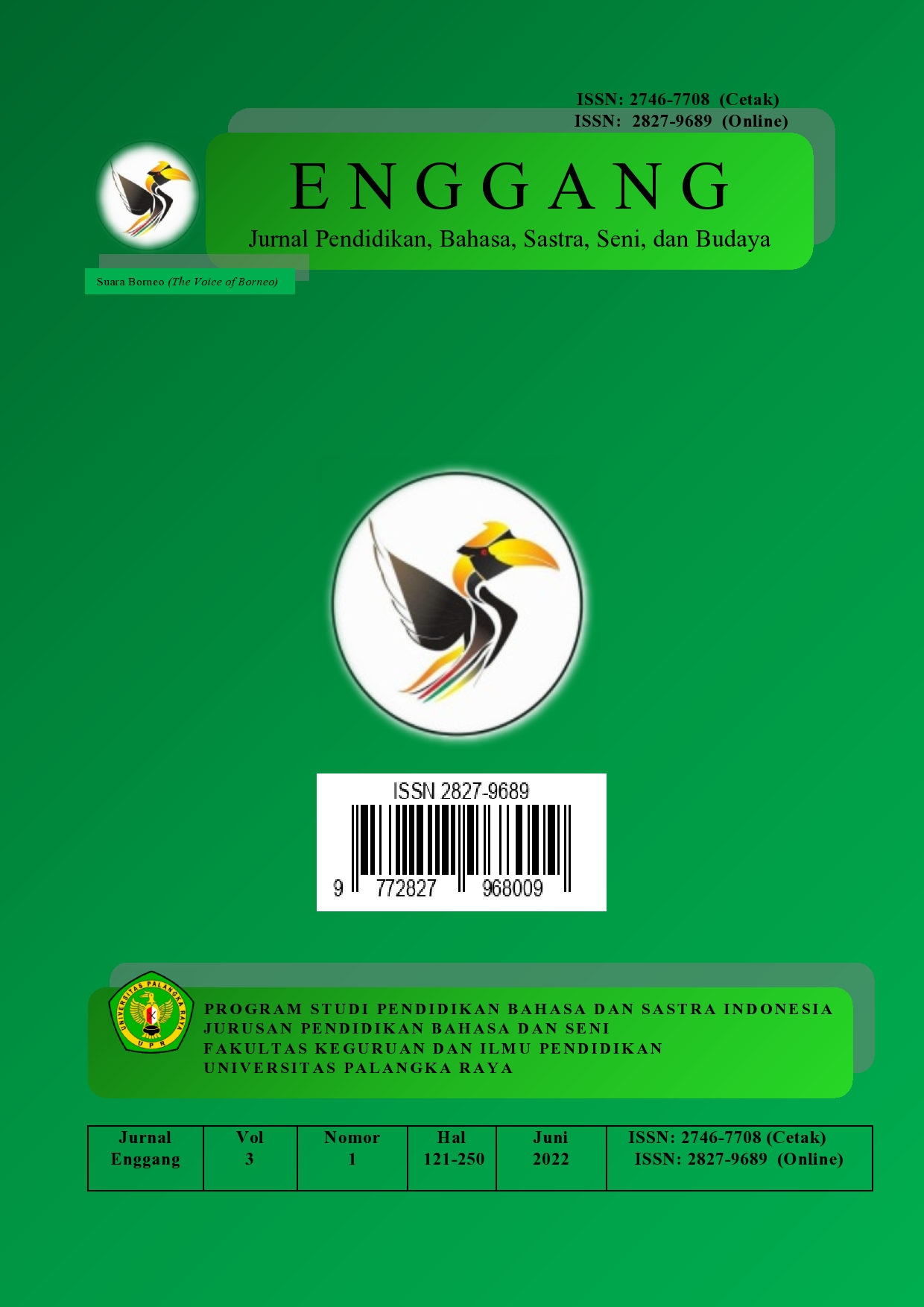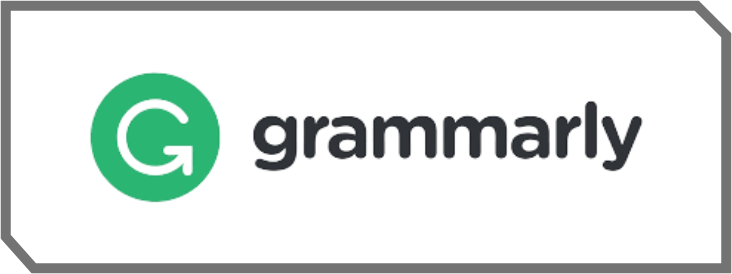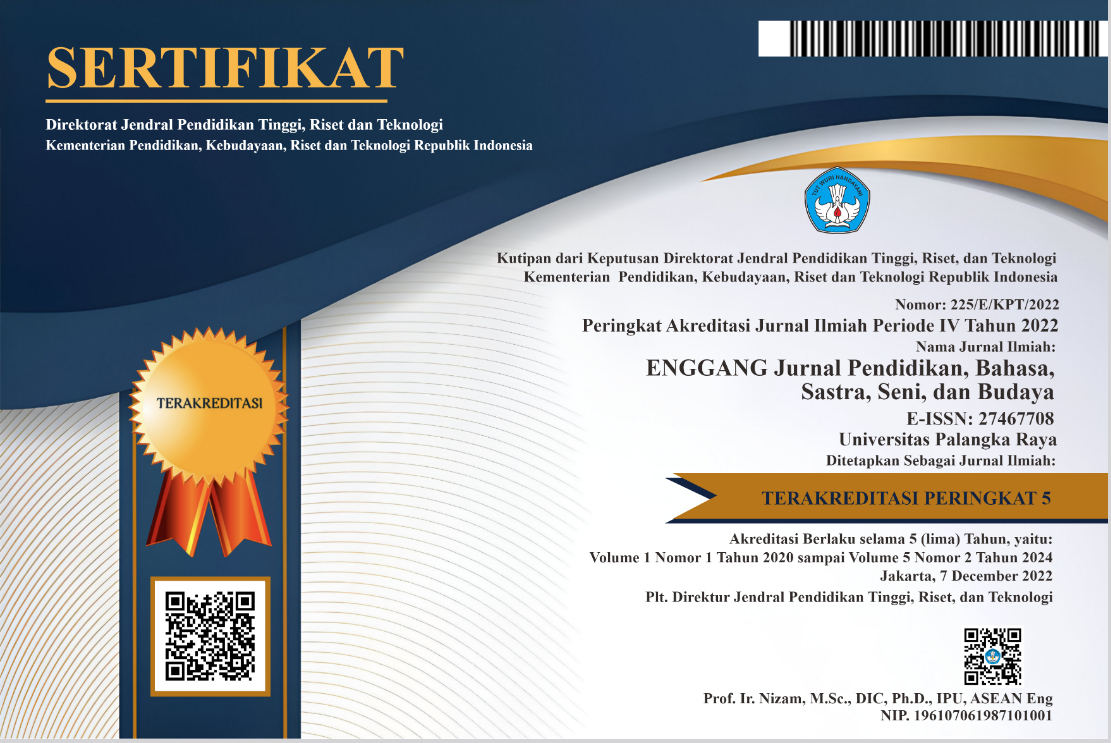ONLINE COLLABORATIVE WRITING TO ENHANCE STUDENTS’ WRITING MOTIVATION AND WRITING ABILITY
DOI:
https://doi.org/10.37304/enggang.v3i2.9120Keywords:
Writing skill, Students’ motivation, online collaborative writingAbstract
Writing has always been a vital skill in English language learning. However, many students struggle with writing. Students are unable to think of what to write despite the teacher providing a topic, spend too much time thinking and use the same vocabulary repeatedly. Furthermore, students were considered to have low motivation for writing and often copied existing paragraphs. The thought of writing is difficult for them, as well as laziness to develop their own ideas. To overcome the writing problem and provide an enjoyable classroom, the author applied an online collaborative writing method through Canva Application to enhance students’ motivation, writing ability, and help the teaching and learning process. This research used the cycle of Classroom Action Research; planning, acting, observing, and reflecting. By giving them pre-test and post-test, mean scores were compared to determine any improvement with writing skills, then a close-ended questionnaire was distributed to investigate their perception to the strategy implemented. This research implied that the strategy was effective to enhance students' writing ability and motivation. The results of students’ tests were improved by 1.31 along with result of the questionnaire about their perception towards online collaborative that almost students agreed that online collaborative writing was a method to enhance their writing motivation. Students writing ability was increased in content, organization, language use, vocabulary, and mechanic aspect.
Downloads
References
Abahussain, M. (2020). Investigating EFL Learners ’ Perceptions of Collaborative Writing Investigating EFL Learners ’ Perceptions of Collaborative Writing. March. https://doi.org/10.5539/ijel.v10n3p32
Abrams, Z. (2016). Exploring collaboratively written L2 texts among first-year learners of German in Google Docs. Computer Assisted Language Learning, 29(8), 1259–1270. https://doi.org/10.1080/09588221.2016.1270968
Abrams, Z. I. (2019). Collaborative writing and text quality in Google Docs. Language Learning and Technology, 23(2), 22–42.
Agustin, R., & Roni, R. (2021). The effect of collaborative writing strategy with google docs and motivation towards eighth grade students’ writing ability on descriptive text. JPGI (Jurnal Penelitian Guru Indonesia), 6(2), 525. https://doi.org/10.29210/021083jpgi0005
Alisha, F., Safitri, N., & Santoso, I. (2019). Students’ Difficulties in Writing EFL. Professional Journal of English Education, 2(1964), 20–25.
Alwahoub, H. M., Jomaa, N. J., & Azmi, M. N. L. (2022). The impact of synchronous collaborative writing and Google Docs collaborative features on enhancing students’ individual writing performance. Indonesian Journal of Applied Linguistics, 12(1), 113–125. https://doi.org/10.17509/ijal.v12i1.46541
Alwaleedi, M. (2022). Attitudes of learners at the Arabic Language Institute at King Abdulaziz University towards Online Collaborative Writing during Covid-19 Pandemic. Arab World English Journal, 2, 302–316. https://doi.org/10.24093/awej/covid2.20
Anggraini, R., Rozimela, Y., & Anwar, D. (2020). The effects of collaborative writing on efl learners’ writing skills and their perception of the strategy. Journal of Language Teaching and Research, 11(2), 335–341. https://doi.org/10.17507/jltr.1102.25
Azodi, N., Lotfi, A., & Ameri-Golestan, A. (2020). Collaborative Writing Practice through Online Learning : Insights from Iranian EFL Learners ’ Perceptions. International Journal of Foreign Language Teaching & Research, 8(29), 165–184.
Babo, R., Dey, N., & Ashour, A. (2020). Workgroups eAssessment: Planning, Implementing and Analysing Frameworks | Rosalina Babo | Springer (Vol. 199). https://www.springer.com/in/book/9789811599071#aboutAuthors
Brescó Baiges, E., & Verdú Surroca, N. (2015). Valoración del uso de las herramientas colaborativas Wikispaces y Google Drive, en la educación superior. Edutec. Revista Electrónica de Tecnología Educativa, 49, a283. https://doi.org/10.21556/edutec.2014.49.39
Brown, H. D. (2004). Language assessment : principles and classroom practices. Pearson/Longman.
Brown, J. D., & Bailey, K. M. (1984). A CATEGORICAL INSTRUMENT FOR SCORING SECOND LANGUAGE WRITING SKILLS. https://doi.org/10.1111/j.1467-1770.1984.tb00350.x
C., L. H. (2011). Students’ perceptions of wiki-based collaborative writing for learners of English as a foreign language. Interactive Learning Environments, 19, 395.
Chen, W., & Yu, S. (2019). Implementing collaborative writing in teacher- centered classroom contexts : student beliefs and perceptions. Language Awareness, 0(0), 1–21. https://doi.org/10.1080/09658416.2019.1675680
Khasinah, S. (2013). Classroom Action Research. Jurnal Pionir, Volume 1, Nomor 1, 1(2), 33–61.
Kuyyogsuy, S. (2019). Promoting Peer Feedback in Developing Students’ English Writing Ability in L2 Writing Class. International Education Studies, 12(9), 76. https://doi.org/10.5539/ies.v12n9p76
Marsevani, M. (2023). Boosting Students ’ Grammatical Competence through Group Work Activities during Covid-19 Pandemic. 7(1), 106–113.
Najogi, J., Adnan, A., & Padang, U. N. (2019). Journal of English Language Teaching USING PEER CORRECTION TOWARDS STUDENTS WRITING. 8(1).
Nggawu, L. O., Husain, D. L., Agustina, S., & Yasin, Y. (2022). The Effectiveness of Collaborative Writing Strategy in Improving Essay Writing Skills of University Students in the EFL Context. AL-ISHLAH: Jurnal Pendidikan, 14(4), 6897–6906. https://doi.org/10.35445/alishlah.v14i4.2738
Oliveira, D. M., & Terra, A. L. (2021). The use of online collaborative writing tools by Ph.D. students. Organização Do Conhecimento No Horizonte 2030: Desenvolvimento Sustentável e Saúde: Atas Do V Congresso ISKO Espanha-Portugal, 863–874. https://eg.uc.pt/handle/10316/94348%0Ahttps://eg.uc.pt/bitstream/10316/94348/1/Olivera.Terra.2021.OCW PhD Students.ISKO2021.pdf
Öz, B., Güler, D., Tufan, E., & Liman, A. (2021). Using Padriseup as a Collaborative Writing Tool in Higher Education EFL Classes. EDEN Conference Proceedings, 1, 1–19. https://doi.org/10.38069/edenconf-2021-ac0001
Pham, V. P. H. (2021). The Effects of Collaborative Writing on Students’ Writing Fluency: An Efficient Framework for Collaborative Writing. SAGE Open, 11(1). https://doi.org/10.1177/2158244021998363
Rashid, A. A., Yunus, M. M., & Wahi, W. (2019). Using Padlet for Collaborative Writing among ESL Learners. Creative Education, 10(03), 610–620. https://doi.org/10.4236/ce.2019.103044
Storch, N. (2013). Collaborative Writing in L2 Classrooms. Multilingual Matters. https://doi.org/doi:10.21832/9781847699954
Storch, N. (2019). Collaborative writing. Language Teaching, 52(1), 40–59. https://doi.org/10.1017/S0261444818000320
Such, B. (2021a). Scaffolding English language learners for online collaborative writing activities. Interactive Learning Environments, 29(3), 473–481. https://doi.org/10.1080/10494820.2019.1579233
Such, B. (2021b). Scaffolding English language learners for online collaborative writing activities. Interactive Learning Environments, 29(3), 473–481. https://doi.org/10.1080/10494820.2019.1579233
Süğümlü, Ü., Hüseyin, H., & Çinpolat, E. (2019). Relationship Between Writing Motivation Levels and Writing Skills Among Secondary School Students. 11(5), 487–492. https://doi.org/10.26822/iejee.2019553345
Veramuthu, P., & Md Shah, P. (2020). Effectiveness of Collaborative Writing among Secondary School Students in an ESL Classroom. Creative Education, 11(01), 54–67. https://doi.org/10.4236/ce.2020.111004
Villarreal, I., & Gil-Sarratea, N. (2020). The effect of collaborative writing in an EFL secondary setting. Language Teaching Research, 24(6), 874–897. https://doi.org/10.1177/1362168819829017
Wulandari, D., Shandy Narmaditya, B., Hadi Utomo, S., & Hilmi Prayi, P. (2019). Teachers’ Perception on Classroom Action Research. KnE Social Sciences, 3(11), 313. https://doi.org/10.18502/kss.v3i11.4015
Zhang, M. (2019). Towards a quantitative model of understanding the dynamics of collaboration in collaborative writing. Journal of Second Language Writing, 45(August 2018), 16–30. https://doi.org/10.1016/j.jslw.2019.04.001
Zuber-Skerritt, O., Altrichter, H., Stephen Kemmis, S., & McTaggart, R. (1991). Routledge Revivals Action Research for Change and Development. https://doi.org/https://doi.org/10.4324/9781003248491













